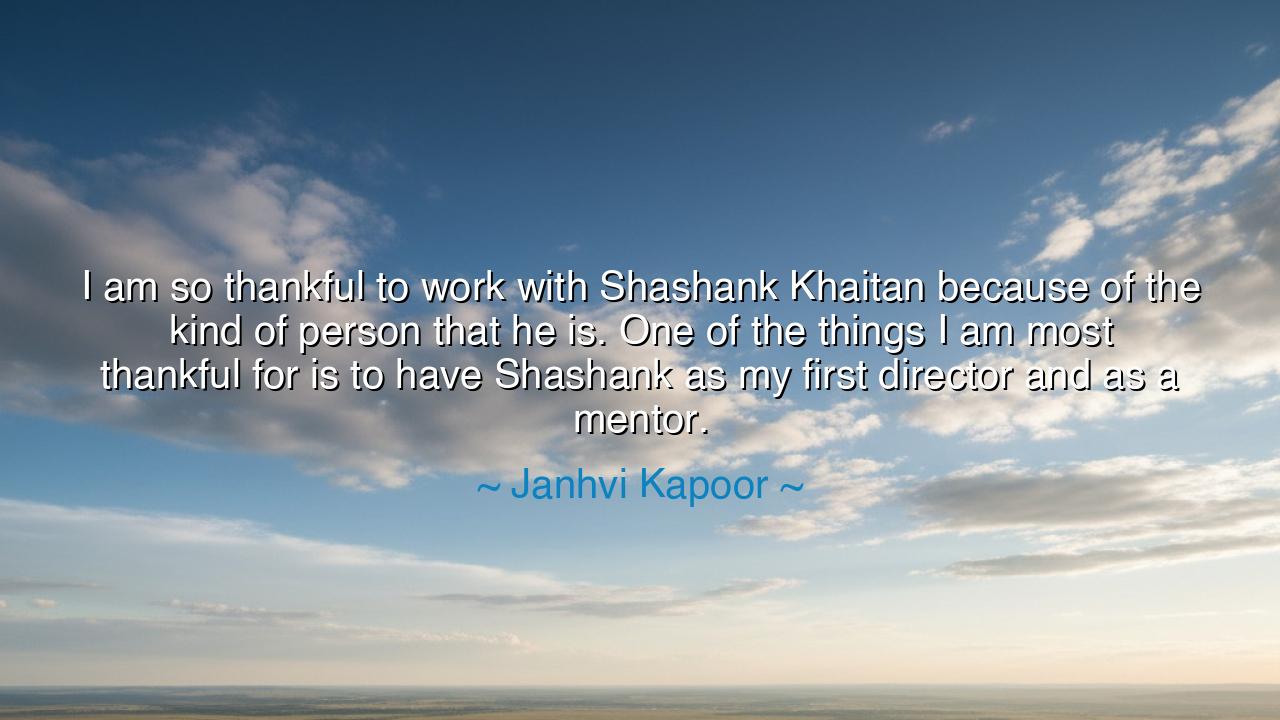
I am so thankful to work with Shashank Khaitan because of the
I am so thankful to work with Shashank Khaitan because of the kind of person that he is. One of the things I am most thankful for is to have Shashank as my first director and as a mentor.






Hear, O seeker of truth, the words of Janhvi Kapoor, who declared with humility and joy: “I am so thankful to work with Shashank Khaitan because of the kind of person that he is. One of the things I am most thankful for is to have Shashank as my first director and as a mentor.” This saying, spoken from the heart, is more than the acknowledgment of a working bond—it is the recognition of guidance, of mentorship, and of the sacred role that another plays in shaping one’s journey. For no star rises into the heavens alone; it is lit by the hands of those who ignite its flame.
The origin of this utterance lies in Kapoor’s early steps into the world of cinema, where the road of the beginner is often uncertain, filled with both hope and doubt. At such a moment, to be entrusted to the care of a mentor is no small blessing. A first director is not only a craftsman of performance, but also a sculptor of confidence, a builder of foundations, and a guide through the uncharted terrain of one’s destiny. Thus, her thankfulness is not only for professional opportunity, but for the nurturing hand of one who shaped her vision with patience and care.
This truth is ancient and enduring. Recall the story of Plato and Socrates. Plato, young and searching, encountered Socrates, who did not give him answers but led him to question, to wrestle, and to grow. Without Socrates, the world might never have received the wisdom of Plato, nor through him the brilliance of Aristotle. The line of mentorship became the river through which philosophy flowed. In the same way, Kapoor’s gratitude to Khaitan mirrors the timeless recognition that greatness is not born in isolation—it is birthed through the bond between mentor and pupil.
In her words, there is also honor given to character, for she praises Khaitan not only for his skill but for “the kind of person that he is.” This reveals a deeper wisdom: that mentorship is not merely about knowledge, but about the spirit of the one who teaches. A cruel or arrogant teacher may pass on techniques, but only a kind and grounded mentor can shape the heart of a student. To be thankful for such a person is to recognize that the greatness of the mentor lies not in what he commands, but in what he embodies.
The lesson here is clear: seek not only knowledge but noble guides. For knowledge without wisdom is like a blade without a handle—it cuts but does not protect. The student must look for mentors whose lives, values, and character reflect the truths they wish to inherit. And when such a guide is found, the response must be gratitude—for these bonds are rare, and they are among the most precious treasures a person may receive.
Therefore, O listener, in your own life, honor those who guide you. If you have teachers, mentors, or leaders who have lifted you higher, do not let their work go unacknowledged. Speak your thanks while they live, and embody their lessons in your own actions. And when the day comes that you stand strong, do not hoard your wisdom—become a mentor yourself, shaping others as you were once shaped. In this way, the chain of guidance remains unbroken, linking generations in strength and understanding.
So let the words of Janhvi Kapoor endure in your memory: to have a first director, a mentor, or a guide of noble heart is no ordinary fortune, but a blessing worthy of endless thanks. Cherish those who lift you, embody the lessons they bestow, and one day pass them forward. For this is how greatness lives on—not in solitary achievement, but in the shared flame passed from one soul to another.






AAdministratorAdministrator
Welcome, honored guests. Please leave a comment, we will respond soon